
There are still some strict laws around Marijuana, and it’s main psychoactive cannabinoid, Delta 9. It’s still a Schedule I drug, and many states have only just begun to introduce marijuana reform. But is there another cannabinoid that created a more controllable euphoric feeling like Delta 9 THC does? Does it sound too good to be true?
Well, it’s true, and it’s called Delta 8. Similar to Delta 9, Delta 8 creates a more controllable high thanks to a slight difference in molecular structure. Delta 8 has a double bond on the 8th carbon chain. Delta 9 has a double bond on the 9th carbon chain. This difference is what makes Delta 8 less potent and more controllable than Delta 9. It’s also how Delta 8 is considered to be federally legal. How is that possible?
Federal Law
The reason Delta 8 is federally legal and Delta 9 is not is because of the Farm Bill. This bill, passed by the USDA in 2018, separately defined hemp and marijuana, something that hadn’t been done since the 1970s when the Controlled Substances Act began. This act placed the whole cannabis plant, whether it was hemp or marijuana, on the Schedule I drug list, where it has remained ever since.
With the Farm Bill now in place, a whole new hemp industry is booming across the country. Just a few short years after this new definition began. The Farm Bill defines hemp as:
“The term ‘hemp’ means the plant Cannabis sativa L. and any part of that plant, including the seeds thereof and all derivatives, extracts, cannabinoids, isomers, acids, salts, and salts of isomers, whether growing or not, with a delta9 tetrahydrocannabinol concentration of not more than 0.3 percent on a dry weight basis.”
So, as long as a product contains less than 0.3 percent of Delta 9, it is hemp. Therefore, it can be grown, produced, sold, and consumed federally. Because Delta 8 and Delta 9 are structurally different, Delta 8 products naturally contain less than 0.3 percent of Delta 9 in them. So Delta 8 products are federally legal.
But just because hemp and Delta 8 are federally legal doesn’t mean that they are legal in every state. States make their own rules and regulations when it comes to hemp, and subsequently Delta 8. It’s how some states have legalized medical marijuana and others haven’t. So, what does Wisconsin state law say about Delta 8?
Wisconsin State Law
Like a majority of the states, Wisconsin has adopted the same definition of hemp as stated in the Farm Bill. The state law does take it a step further and state:
“‘Hemp’ means the plant Cannabis sativa L. and any part of that plant, including the seeds thereof and all derivatives, extracts, cannabinoids, isomers, acids, salts, and salts of isomers, whether growing or not, with a delta-9-tetrahydrocannabinol concentration of not more than 0.3 percent on a dry weight basis or the maximum concentration allowed under federal law up to 1 percent, whichever is greater, as tested using post-decarboxylation or other similarly reliable methods. ‘Hemp’ does not include a prescription drug product that has been approved by the U.S. food and drug administration.”
It’s a more robust definition to clarify Delta 8 for the citizens of Wisconsin. Laws are always subject to change. Research the laws in your state before purchasing and consuming any Delta 8 products.
Make sure to check back for more cannabis and hemp related news.